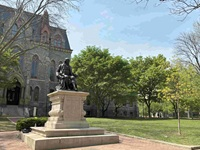Speaker
Description
Superconducting qubits offer a promising new platform for detectors as a result of their natural sensitivity to their environment. In recent years superconducting qubits have made huge strides in performance and quality. These devices have already demonstrated exceptional sensitivity for prototype dark matter searches due to their high sensitivity. As qubits achieve higher coherence times, the need for a low background environment becomes critical to realize their full potential as detectors. There is still significant room to optimize the local qubit environment. We have studied qubits in increasingly optimized configurations by monitoring our T1, T2, T2Echo, effective temperature, and single shot fidelity measurements as we’ve gradually improved our shielding, filtering and thermalization schemes. These general qubit parameters directly impact how intricate of measurement schemes can be deployed. It is through these measurements that qubits are able to perform as high quality sensors. A brief overview of how different backgrounds can effect such qubit devices will be provided followed by the improvements that we observed. We will further discuss the details of effective shielding and how to properly implement some of these important features.
